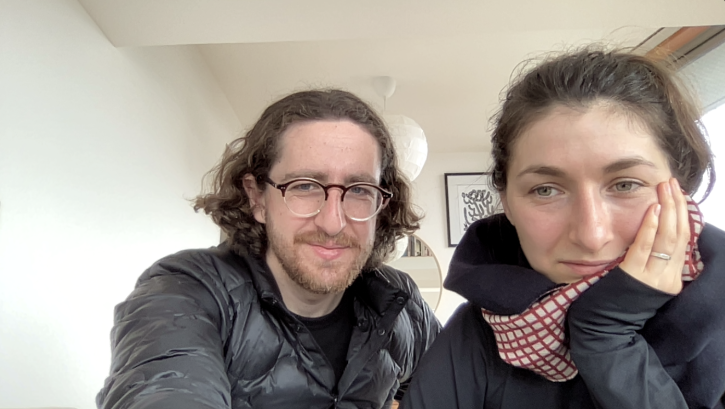War in Europe: Ukraine’s Tragedy Demands Our Attention
April 6, 2022
At the end of February, the words on everyone’s mind were Ukraine, Russia and War. Now, students and teachers are still aware of the unfolding events, but it is no longer an active topic of conversation.
And that is a problem, according to Noah Sneider, a correspondent for The Economist magazine, who spent seven years covering Russia and Ukraine, including the first phase of the war in eastern Ukraine in 2014.
On Mar. 25, Noah and his wife, Uliana Dobrova, spoke with the Journalism class over Zoom about their experiences with the Russia-Ukraine war. Although they no longer live in Moscow, they have family members and friends living in both countries and have been doing their best to help from afar. The conversation ranged from personal stories to political aspects to the influence of media, and touched on ways that people here can get involved.
“People in Ukraine are worried that everyone’s attention will fade in the rest of the world,” Noah said. “Trying to keep people’s attention and keep the pressure on, in terms of world opinion — it’s not going to stop the bombs from falling, but governments in the United States and Europe respond to what the public cares about.”
After Biden warned in late January that Russia was preparing to invade Ukraine, people feared war. These fears intensified when Biden evacuated U.S. diplomats from Ukraine.
On Feb. 24, President Vladimir Putin announced a “special military operation”, claiming that Ukraine was committing genocide against Russians and that the government was run by Nazis, neither of which is true.
Noah and Uliana, who are currently living in Tokyo, Japan, where Noah is Bureau Chief for The Economist, said it took time to even understand what was happening.
“It seemed too crazy, risky, and dramatic to believe,” Noah said.
Uliana agreed. “I always thought people who are in politics are responsible grown-ups,” she said. “It seems like they all went insane.”
While attacking cities across Ukraine and laying siege to civilian communities, Putin has continued to say that his goal in Ukraine is to “denazify” and “demilitarize” the country, and his government’s leaders echo this claim. In an interview on a leading Russian television program, Deputy Defense Minister Dmitry Polyansky denied that Russia is purposely attacking Ukrainian civilians, saying that those rumors had been debunked.
“Everything they’re saying is more than a lie, so twisted, it’s like a porridge of propaganda statements,” Uliana said.
Although censorship was already increasing in Russia under Putin, recently he established laws that make it a crime for journalists to use aggressive language such as “attack,” “invasion,” and “war” to describe what is happening now. Using those words or expressing opposition to the war can land a journalist – or other citizen – to prison for 15 years. Additionally, social media networks ranging from Facebook to TikTok have been banned in Russia, leaving citizens with few sources of information beyond the government-run media.
“Now the state has ‘tightened the screws,’ becoming more closed and adding more pressure,” Noah said. “Some people go to protests, but every time you go, you risk being arrested.”
People around the world are appalled at the violence in Ukraine, but the importance of this faraway war goes beyond the tragedies in Ukraine, Noah said.
“Part of what Putin is doing is challenging the system, or world order, that’s been in place for a few decades,” Noah said, “where America is the dominant power, and rules and systems and structures that govern international relations matter.”
Feeling distraught over the events and eager to do what he could do help, Noah started a Twitter account named War in Translation (@WarTranslation) where he and other volunteers translate materials from blogs and independent journalists from Russia and Ukraine into English, to bring those voices forward.
“I was feeling very helpless and useless sitting here in Tokyo when this was happening so far away,” Noah said.
When students asked how to best get involved, Noah and Uliana suggested finding ways to bring people’s attention back to the war. They suggested re-sharing posts, attending protests, and contributing to local efforts to support Ukraine. Uliana said that she has learned that even something as simple as wearing a COVID-19 mask in the Ukrainian flag colors will draw people closer and start conversations.
“If you have a small symbol on you, like starting to put yellow and blue everywhere, the colors are so vivid, you immediately notice it everywhere,” Uliana said. “You can wear these colors, this will remind people immediately about the suffering and what’s happening. It’s like a QR code.”
Noah and Uliana emphasize that staying informed and supporting Ukrainian efforts, pressures Western governments and corporations to oppose the war through public policy and commercial practices.
“The aggregate pressure of the attitude of the world matters,” Noah said. “So don’t forget.”
